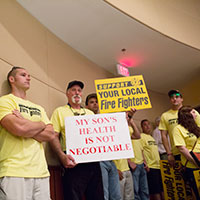 Three county fire stations to finally be tested for toxic mold
Three county fire stations to finally be tested for toxic mold
STORY
Instead of settling anything, last Friday’s 14-hour County Commission hearing on the contract dispute impasse with the firefighters union only tore open in the public eye what would appear to be a systematic communications breakdown between the county’s 220-plus firefighter-paramedics and those who manage the department.
Three fire stations where the nine firefighters who have tested positive for toxic mold exposure work will finally be tested, repaired and have water damage remediated. The Board was also set to determine if and how to move firefighters out of the affected stations and into temporary housing.
Commissioner Tim Zorc said the county needs to know for sure that the firefighters’ exposure to mold came from the stations where they work and live one-third of their lives, and not from another external source.
“You test the person, you test where they work, you test where else they work. You test their residence, you test the vehicle that they may be in 8-10 hours a day,” Zorc said. “If it’s our problem, we need to fix it. But we need to make sure that it’s our problem.”
The International Association of Firefighters Local 2201 asked many months ago to be allowed to test the stations at the union’s expense, but county staff denied them access. At that point, firefighters got the state fire marshal’s office involved, further degrading the strained relationship with management.
"We are grateful for the outpouring of support from the community and from our fellow firefighters from neighboring counties," said John O'Connor, a 15-year firefighter and president of the IAFF Local 2201. "And we are glad that our members are going to be removed from this dangerous situation and to finally have the stations tested for mold."
O'Connor said he hopes the result of Friday's proceedings is that every Indian River County firefighter will soon be serving and living in "a healthy and safe workplace."
Providing a “healthy and safe workplace” was wording that four out of five commissioners were unwilling to put in the union contract, as legal counsel told them that making sure fire stations were healthy and safe could cost more than they wanted to spend. The county’s labor attorney, Jeffrey Mandel, said the words “safe and healthy work environment” were too vague.
“It would allow an arbitrator to come in and determine what is a safe and healthy work environment and maybe how you need to expend funds,” Mandel said. “What the union is asking to do here is to give up local control. It makes absolutely no sense, and it’s a dangerous precedent for you to turn over that control. I can’t stress enough what a colossal mistake it would be to put this language in there.”
Commissioner Joe Flescher, a career law enforcement officer, disregarded the attorney’s warning and voted in favor of the “safe and healthy” language, but he was the only one, and the language was voted down 4-1.
The problem of the working conditions at the stations, however thorny and embarrassing to the county that might be, could actually be the easiest problem to solve.
Other issues that have resulted in firefighters’ low job satisfaction, and seasoned members abandoning Indian River County for careers elsewhere, will likely persist until management and labor – despite vastly different positions on issues and decades-old personal grudges – regain each other’s basic trust.
That is no short order. As the firefighters’ attorney, Matt Mierzwa, said about four hours into the proceedings, “Unfortunately, Article 14 (health and safety) was an appetizer and this is a buffet of problems.”
Commissioners spent an inordinate amount of time discussing issues that sounded like micro-managing the day-to-day operations of fire department – many of which were left unresolved.
Questions related to short staffing, replacement of safety equipment, scheduling of employees, promotion criteria, salaries and benefits – on nearly all of which commissioners voted with County Administrator Joe Baird’s recommendations and against the firefighters – will now go to union members for an up or down vote.
If the union fails to agree to the board’s decisions, the county can impose the changes for the contract year, which was over more than a year ago.








